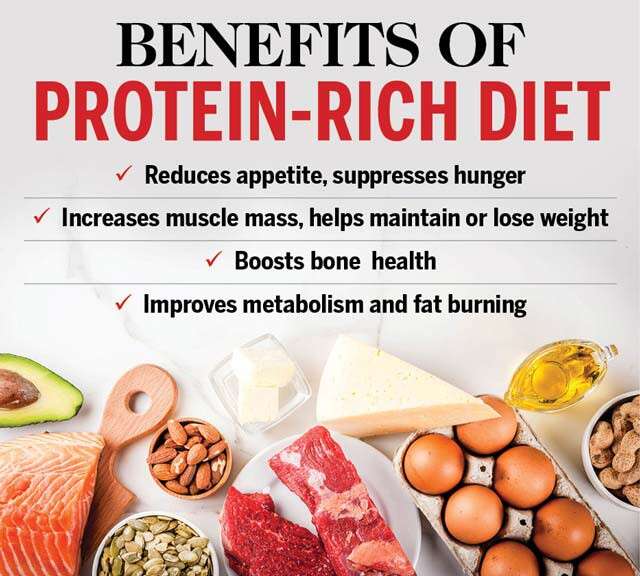Health Benefits of Protein
Protein is an essential macronutrient that plays a crucial role in maintaining good health. It is composed of amino acids, which are the building blocks of our body. Consuming an adequate amount of protein is vital for various bodily functions and can provide numerous health benefits. In this article, we will explore the significant health benefits associated with protein consumption.
Muscle Growth and Repair
Protein is well-known for its role in muscle growth and repair. When we engage in physical activities such as weightlifting or endurance training, our muscles undergo stress and micro-tears. Protein helps in repairing and rebuilding these damaged muscle tissues, promoting muscle growth and strength. It is essential for athletes, fitness enthusiasts, and individuals recovering from injuries to consume sufficient protein to support their muscle recovery process.
Weight Management
Protein can be a valuable asset in weight management. Including protein-rich foods in your diet can increase satiety, making you feel fuller for longer periods. This can help reduce overall calorie intake and curb unhealthy cravings, ultimately aiding in weight loss or weight maintenance. Additionally, protein has a higher thermic effect compared to carbohydrates and fats, meaning it requires more energy to digest. This can slightly boost your metabolism and contribute to calorie burning.
Blood Sugar Regulation
Consuming adequate protein can help regulate blood sugar levels. When we consume carbohydrates, they are broken down into glucose, leading to a rise in blood sugar levels. However, when protein is consumed alongside carbohydrates, it can slow down the absorption of glucose, preventing sudden spikes and crashes in blood sugar levels. This can be particularly beneficial for individuals with diabetes or those at risk of developing the condition.
Bone Health
Protein plays a crucial role in maintaining optimal bone health. It is not only calcium that is important for strong bones, but protein also contributes significantly. Collagen, a protein found in bones, provides structural support and helps maintain bone density. Consuming enough protein can aid in preventing bone-related conditions such as osteoporosis and fractures, especially in older adults.
Immune Function
Protein is essential for a healthy immune system. Antibodies, which are proteins, help fight off infections and protect our body against harmful pathogens. Insufficient protein intake can weaken the immune system, making us more susceptible to illnesses and infections. Including protein-rich foods in your diet can help strengthen your immune system and promote overall well-being.
Wound Healing
Protein plays a vital role in the wound-healing process. It aids in the formation of new tissues and helps repair damaged cells. When we experience injuries or wounds, our body requires an increased amount of protein to support the healing process. Consuming enough protein can expedite wound healing and reduce the risk of complications.

Protein is an essential nutrient that offers a wide range of health benefits. From supporting muscle growth and repair to aiding in weight management, regulating blood sugar levels, maintaining bone health, boosting immune function, and facilitating wound healing, protein plays a crucial role in our overall well-being. Ensure you include protein-rich foods in your diet to reap these incredible health benefits.
Frequently Asked Questions – Health Benefits of Protein
1. What are the health benefits of consuming protein?
Protein is essential for building and repairing tissues, producing enzymes and hormones, and supporting a healthy immune system.
2. How much protein do I need in my diet?
The recommended daily intake of protein varies depending on factors such as age, sex, and activity level. Generally, adults should aim for 0.8 grams of protein per kilogram of body weight.
3. Can protein help with weight loss?
Protein can increase feelings of fullness and help reduce cravings, making it beneficial for weight loss. It also requires more energy to digest, which can boost metabolism.
4. Are there any risks of consuming too much protein?
Consuming excessive amounts of protein can put a strain on the kidneys and liver. It is important to maintain a balanced diet and not rely solely on protein for nutrition.
5. What are some good sources of protein?
Protein can be found in both animal and plant-based foods. Good sources include lean meats, poultry, fish, eggs, dairy products, legumes, nuts, and seeds.
6. Can protein help with muscle building?
Protein is crucial for muscle growth and repair. Consuming an adequate amount of protein, along with regular resistance exercise, can support muscle building.
7. Is it necessary to consume protein supplements?
Protein supplements can be beneficial for individuals who struggle to meet their protein needs through food alone, such as athletes or those with certain medical conditions. However, most people can obtain sufficient protein from a balanced diet.
8. Does protein have any impact on bone health?
Protein plays a role in maintaining bone health and preventing age-related bone loss. It helps in the production of collagen, which is a major component of bones.
9. Can protein help regulate blood sugar levels?
Protein can help stabilize blood sugar levels by slowing down the absorption of glucose from carbohydrates. This can be beneficial for individuals with diabetes or those at risk of developing it.
10. Are there any specific protein requirements for athletes?
Athletes may have higher protein requirements due to increased muscle repair and growth. It is recommended for athletes to consume 1.2-2 grams of protein per kilogram of body weight, depending on their sport and training intensity.




